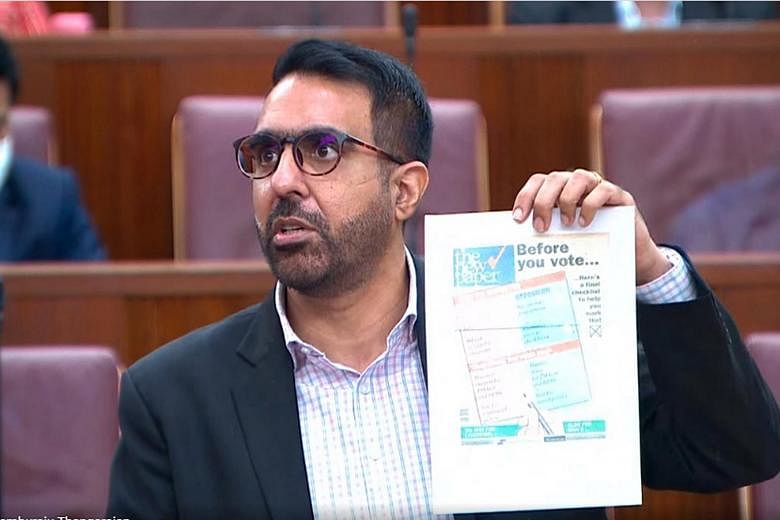SINGAPORE - Leader of the Opposition Pritam Singh (Aljunied GRC) on Monday (May 10) clashed with Communications and Information Minister S. Iswaran over the Government's potential funding as well as the editorial independence of Singapore Press Holdings' (SPH) new media entity.
The Workers' Party chief was responding to a ministerial statement in Parliament by Mr Iswaran on SPH's proposal to hive off its media business to a not-for-profit company limited by guarantee (CLG). The Government has backed the move and said it is prepared to provide funding for the entity.
Mr Singh's pressing for more details of funding towards the end of the debate saw Mr Iswaran telling him not to "miss the wood for the trees" or make "political capital" out of the matter.
Mr Singh, who rose twice to seek clarifications, asked what the Government would do to ensure the independence of the CLG from possible government interference, and to foster a culture of editorial independence across SPH's titles.
He also asked if the Government would consider forming a select committee to allow members of the public to express what editorial standards they expect from the CLG's taxpayer-funded mainstream media, and to express their views on how best the SPH CLG can ensure editorial independence from any government of the day.
In response, Mr Iswaran said he would venture that a culture of editorial independence already exists in Singapore's news media.
"We do a disservice to our journalists and editors to suggest anything to the contrary," he said.
On the suggestion of a select committee, Mr Iswaran said: "If I understand correctly, it's about enabling people to express their views. I would say Singaporeans have already expressed their views. Because, first, when it comes to trust surveys, Singapore scores highly. Singaporeans have been quick to point out that they trust our news media, both print and broadcast."
The minister pointed to surveys he had highlighted in his ministerial statement earlier. A 2020 survey by British polling firm YouGov found seven in 10 Singaporeans trusted reporting by local media on Covid-19, compared with three in 10 people in Britain who trusted reporting by British newspapers on the virus. The 2021 Edelman trust barometer also reported Singaporeans' trust in local media at 62 per cent, above the global average of 51 per cent, 45 per cent in the United States, and 37 per cent in Britain and France.
"The fact is, as I said and I want to re-emphasise, the SPH news organisations in aggregate have not just maintained but have grown their reach and readership when you combine the digital and the physical," said Mr Iswaran.
"That would not be the case if Singaporeans did not feel that they could trust the news organisation. So I think the people have spoken, and I think it's our job now to make sure the object of their trust continues to succeed."
Making a second set of clarifications towards the end of the debate, Mr Singh presented a printout of a New Paper front page from the 1997 General Election.
"It was a checklist to help you decide how to vote," he said. "Minister spoke earlier about objectivity and balance. The only thing objective about this cover page is the EPL (English Premier League) scores - no win for Liverpool and also for Manchester United.
"The checklist essentially told the voters what you're voting for if you vote for the PAP (People's Action Party): You are voting for upgrading, Edusave, and MPs of acceptable character."
Mr Singh then pointed out how SPH's The Straits Times and Lianhe Zaobao had, in recent weeks, offered varying perspectives on Singapore's fourth-generation leadership transition.
"There can be different views on the quality and standards of journalism in Singapore, and it is for that reason that I put my earlier question to the Minister about a select committee, and to try and get some understanding from the public what they expect of a taxpayer-funded CLG," he said.
Mr Iswaran replied: "I'm disappointed that the Leader of the Opposition has decided to make political capital out of something that I think is quite fundamentally important to us.
"Even in the examples that he cites, he has already illustrated the point that I'm making. He went back to 1997 to bring out an example. And then he says the Chinese media put forward one point of view and the English media put out another point of view.
"Isn't this the diversity that the Leader of the Opposition has been talking about?" Mr Iswaran asked. "So, I am not very clear why he thinks the current model is not succeeding. Is it perfect? No. I would challenge him to show me a model that works and that is perfect. But is it one that works in our context? I think it does, with some areas for improvement, certainly, but it's an evolutionary process."
He added: "What we want at the end of the day is not posturing, but substance. If we can achieve that not just in the news media but also in this Chamber, I think we would have gone a long way to building a stronger country and nation."
Earlier, Mr Singh asked when the Government had first informed SPH that it was prepared to extend grants to support its media business; and what the size of the funding would be. "Does the Government aim to cap the grants it extends with the expectation that the CLG would also secure other sources of funding from the private sector, for example?" Mr Singh added.
Mr Iswaran replied that the Government has always been willing to support investments in capability development. "And then it is up to the respective organisations to develop their plan, and to put forward their proposals to us. In the case of SPH, specifically, as I mentioned, last year they received the JSS (Jobs Support Scheme)," he said.
"In addition, we were prepared to offer extra help if it was required, but the restructuring proposal was put to us."
The minister said it would be premature to specify the exact numbers that would go into the Government's funding of the CLG.
"(It) is not because we are reluctant to talk about them, but it's simply because first, this is still a matter before the shareholders of SPH. They have to decide whether they want to approve this. It is only after that, that we can really get into a more detailed discussion," said Mr Iswaran.
"We also need the new CLG to then formulate its plans and put on the table what it sees as its strategic business direction going forward," added the minister.
"Not-for-profit does not mean that the entity does not pursue its business on a commercial basis, and we fully expect the entity to seek out advertising revenue, circulation or subscription revenue, and other sources of funding. But we fully expect that Government funding will be a component of that funding matrix for the CLG."
Mr Singh later said he "would be surprised if the Government hadn't considered what would be the extent of the grant that it would extend to the CLG".
He asked for a ballpark figure, but Mr Iswaran said this was "precisely the problem" - that any range of figures provided would only lead to more requests to narrow it down further.
"I think we should be talking about these sorts of matters when we have greater clarity," he said. "When the funding is finally decided upon, it will have to come back to this Chamber, because it will be part of the budget of the Ministry of Communications and Information (MCI) and the member and his party would have ample opportunity to ask all the specific questions," said Mr Iswaran.
"It's not about the details right now, it's about the overall thrust of what we are trying to do."
Mr Singh also asked if MCI considered SPH's contribution to the CLG to be a reasonable one.
SPH will provide initial resources and funding by capitalising SPH Media with a cash injection of $80 million, $30 million worth of SPH shares and SPH Reit units, and SPH's stakes in four of its digital media investments.
Mr Iswaran stressed again that this was a matter to be put to the shareholders.
"I do not want to pre-empt any case that the management and the board will make, but I can say that the Government's focus has been very clearly on the news media business, and its viability going forward," he said.
"The medium- to long-term outlook remains challenging, and that is why we need to be clear that the Government will be prepared to come in to give support. But how much, how; I think these are the things that will need to be worked out in due course after the CLG has had a chance, subject to shareholder approval, to then develop a business plan and put the proposal to us."
Read key highlights of the ministerial statement on SPH media restructuring here


